Mo Brooks’ long career of slamming Alabama taxpayers with increases, fees
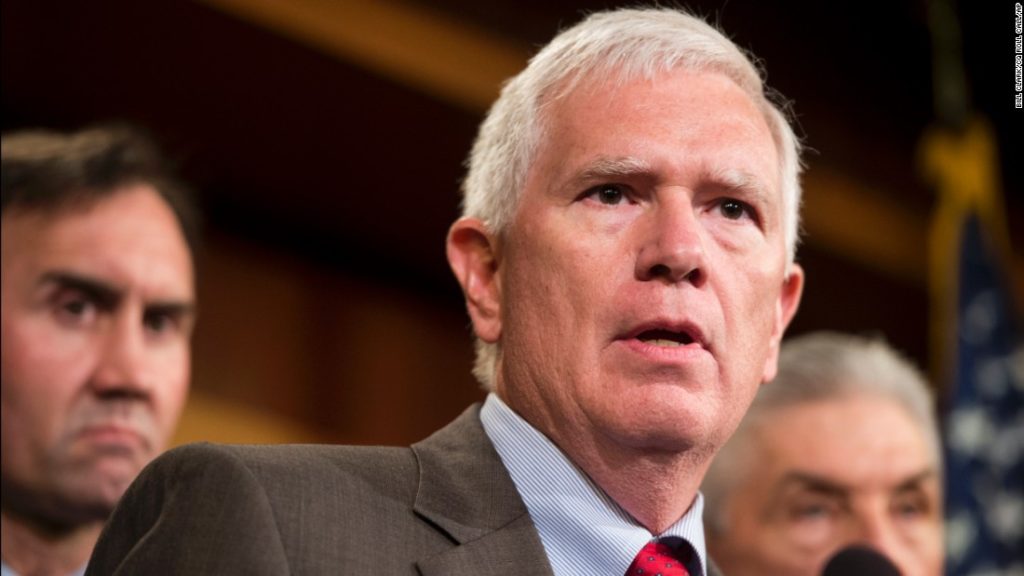
Senate candidate Mo Brooks wants to be seen as a “proven conservative,” especially on fiscal matters. But actual proof suggests the opposite. On his 2010 congressional campaign website, the Huntsville Republican makes an audacious claim: to have “vigorously fought tax increases as an Alabama legislator, a Madison County Commissioner, and a citizen.” Brooks even goes as far as to link to a pair of signed pledges: Taxpayers Protection Pledge — Americans for Tax Reform and the No Climate Tax Pledge — Americans for Prosperity, both promoting strict anti-tax promises. In his Senate campaign, Brooks continues to carry the fiscal responsibility banner, railing against Congress’ attempts to change the Affordable Care Act by calling it a “Republican Welfare Program.” And Brooks tells Alabama Today he is running “because America needs an ethical, principled conservative who has the intellect and backbone to face and defeat America’s challenges.” As he faces an uphill climb in Alabama’s Aug. 15 GOP primary — solidly third in most recent polling — Brooks’ boasts recall the old saying: “”The best predictor of future behavior is … Past behavior.” With that in mind, a closer examination of his Alabama voting record — particularly on the county and state levels — shows his anti-tax rhetoric does not tell the complete story. For more than a decade, Brooks represented District 5 of the Madison County Commission, from 2000 to 2011, before winning the first of four terms in the U.S. House. During that time, the Huntsville Republican amassed a considerable history of supporting tax and fee increases on local constituents, a record that seems to contradict later campaign promises and his membership in the House Freedom Caucus, a group that emerged from the 2008-2010 Tea Party wave. Tea Party, for those who may have forgotten, stands for “Taxed Enough Already,” a grassroots movement set up under the principle of fiscal responsibility and actively resisting government taxation in most forms. In his time in public service — in the Madison County Commission, and before that, an earlier stint in the Alabama House — Brooks “represented” Alabama taxpayers by way of several (successful and attempted) tax and fee raises. Prominent examples include September 1997, when, as Madison County Commission water department liaison, Brooks supported a $6.50 monthly per-household increase in the county’s water rate, something Huntsville Times business reporter Mike Salinero questioned in “Who Will Pay for Soaring Water Use in Thirsty County?” Later, as a Madison County commissioner, Brooks approved a 2006 Tax Increment Financing (TIF) measure that would borrow money to fund construction projects, which, the Huntsville Times reported at the time, would have to be paid with “anticipated increased property taxes.” Also in 2006, Commissioner Brooks voted to raise property taxes, followed by another proposal to raise property taxes and other tax increases just one year later. He did the same thing in 2008, again calling for increased property taxes. The following year, the Huntsville Times strongly criticized a Brooks’ proposal — one that would blanch a present-day fiscal conservative. This time, Brooks again argued that the “only way” to pay for needed school construction was through higher property taxes. As an alternative, Brooks offered several possibilities for raising revenue in Madison County — all of them distasteful to anti-tax proponents: increases in property and sales taxes, as well as a state measure to lift caps on the amount of property tax levied for Madison County schools. Madison County Board Member John Ehinger panned Brooks’ tax-and-spend pitch, writing in a March 2007 Huntsville Times op-ed that while they “are real enough … none of them is workable.” “If local schools need more money to build and renovate facilities, is there an alternative to the proposed half-cent countywide sales tax?” Ehinger wrote. “Well, it depends. Solutions to problems generally fall into two categories: the theoretical and the practical. Theoretical solutions might do a better job in some instances, provided you can put them in place. The theoretical solutions to the financial needs of the three local school systems, some of which were outlined last week by County Commissioner Mo Brooks, are real enough, but none of them is workable.” Finally, in 2009, Brooks wanted folks to pay more in garbage fees, voting for a $13.50-a-month garbage fee increase in Madison County. Nevertheless, this laundry list of Brooks’ tax-happiness goes even further back, including his days in the Alabama House, where he served from 1982-92 — often landing on the same side as Democrat George Wallace, who served his final term as Alabama Governor from 1983-87. Most notably, Brooks tried to seek voter approval for increasing income taxes on Alabama families and businesses (by as much as 20 percent) during the House Regular Sessions in 1983, 1984, 1987 and 1988. In those days, Brooks championed a wide range of tax and fee increases, everything from annual fees on natural gas meters, a liquor tax hike, a “tax crackdown” bill, privilege taxes on dog racing, allowing city and county school boards to levy sales taxes, a gasohol tax hike, raising hunting and fishing fees, and raising cigarette taxes. In 1983, the Alabama House passed a bill that to levy a “50-cent annual fee on every natural gas meter in the state,” as reported by The Associated Press’ Phillip Rawls in “House OKs Gas Meter Fees.” That same Session, lawmakers passed a bill sending “additional mark ups’” (taxing, just by another name) on liquor to Alabama’s General Fund — something that observers at the time believed would raise liquor prices across the board. Alabama’s “Journal of The House” shows Brooks voting “Yea.” Brooks also voted for a Gov. Wallace’s “Tax Crackdown” measure, aggressively going after delinquent Alabama Taxpayers. H 13, considered during the state’s Fourth Extraordinary Session that year, was titled: “Increase Revenue and Promote Compliance with The Tax Laws by Providing the Means for A More Effective And Efficient Enforcement Of Said Tax Laws.” Records show that Brooks voted for both the House and conference versions of the crackdown bill. In 1984,
New polling shows tight race for Roy Moore, Luther Strange in GOP Senate primary
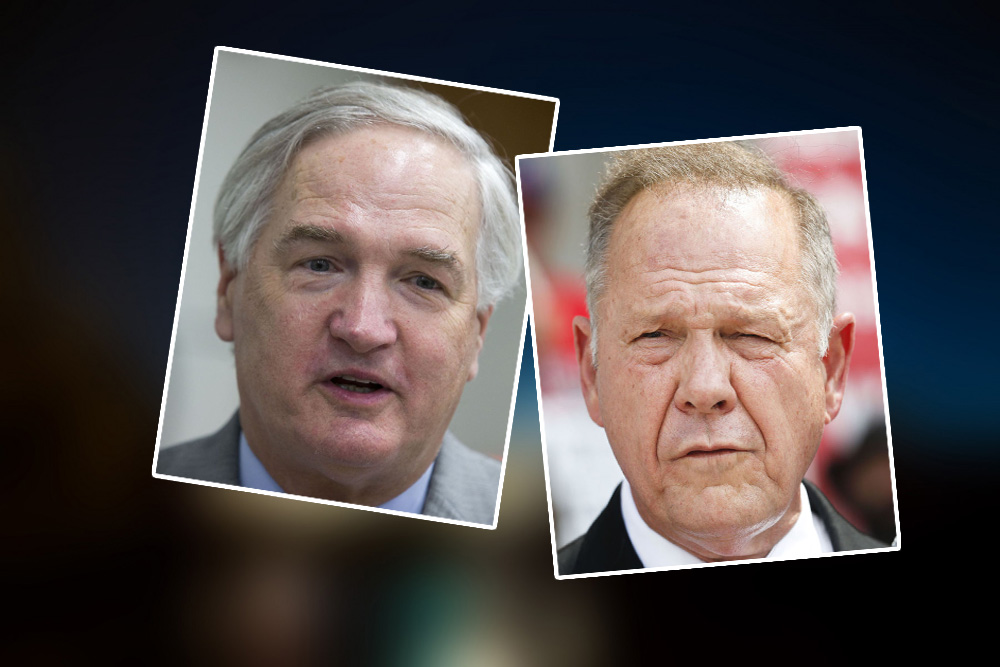
As the contentious Alabama U.S. Senate race heats up, new polling shows a tight contest between former Alabama Supreme Court Chief Justice Roy Moore and sitting U.S. Sen. Luther Strange. The Montgomery Advertiser reports on a new poll of 426 likely Republican voters showing Moore holding a narrow lead over Strange, 31 percent to 29 percent. The numbers were within the poll’s 5 percent margin of error. Huntsville Republican Congressman Mo Brooks comes in third at 18 percent, with state Sen. Trip Pittman of Baldwin County gets 8 percent and Alabama Christian Coalition president Randy Brinson with 2 percent. Eleven percent are undecided. Other Republican candidates on the ballot include Dr. James Beretta, Joseph Breault, Mary Maxwell and Bryan Peeples Meanwhile, SuperPAC’s are preparing ahead of the Aug. 15 Republican special primary. Senate Leadership Fund, the committee linked to Majority Leader Mitch McConnell, has banked over $1.5 million in 26 days in July. SLF has been spending heavily to back Strange, appointed to the Senate seat in February after Jeff Sessions stepped down to become Donald Trump’s Attorney General. According to Federal Election Commission reports, mostly through a $1 million check from hedge fund manager Steven A. Cohen and $250,000 from Phil Ruffin, owner of the Treasure Island Hotel and Casino in Las Vegas. Most of SuperPAC’s attention in the race has been focused on Brooks, attacking him for lack of fidelity to then-candidate Donald Trump, who later carried Alabama easily in the 2016 presidential race. Recently, the group opened up a second front with some new attack ads targeting Moore, a popular far-right social conservative. The National Rifle Association of America Political Victory Fund also reported spending $43,117 on radio ads to boost Strange, according to a newly filed independent expenditure report dated Aug. 2. The race will most likely result in a Sept. 26 runoff between the two top vote getters, since it appears that no single candidate will receive a majority. The last day to apply for an absentee ballot for the primary is Thursday, Aug. 10.
Get to know Mo Brooks, Republican running for Alabama U.S. Senate seat
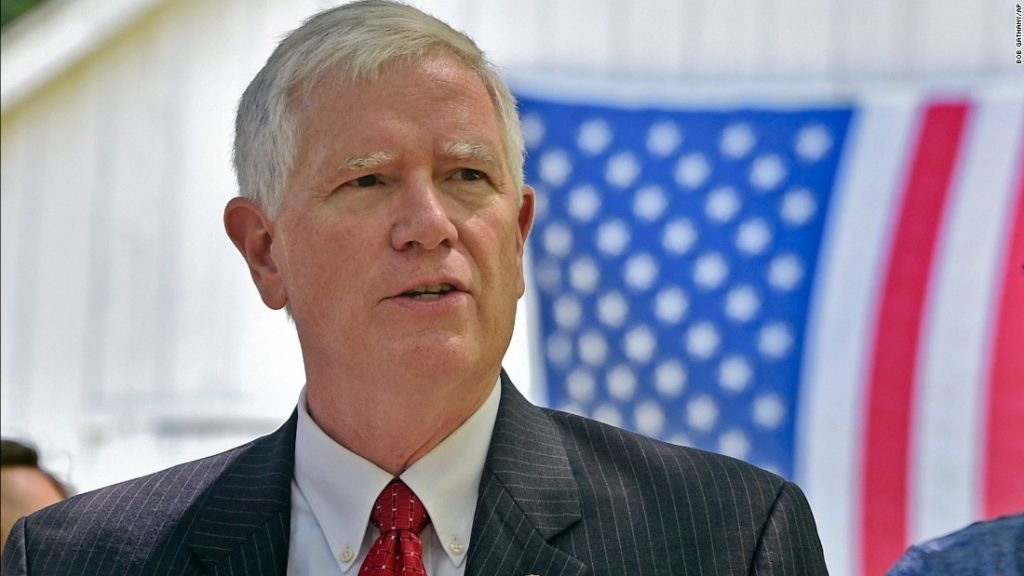
11 Republicans and eight Democrats will officially move forward to their party’s August 15 primaries to vote in the Alabama special election to replace Jeff Sessions in the U.S. Senate With a little over three months until voters head to the ballots, AlabamaToday.com is inviting all of the candidates, including appointed-incumbent Sen. Luther Strange, to complete a questionnaire we believe offers an interesting, albeit, thumbnail sketch of who they are and why they are running. If you are a candidate and would like to complete the questionnaire, email Elizabeth@ALToday.com. Today’s candidate spotlight features the Alabama’s 5th District U.S. Rep. Mo Brooks, the four-term congressman who’s looking to move to the upper chamber in hopes to giving America the sort of Senator he believes this country needs — “an ethical, principled conservative who has the intellect and backbone to face and defeat America’s challenges.” Here he is in his own words: Significant other? Kids? I’ve been married to my wife, Martha, for 41 years. We have 4 wonderful children, 3 wonderful children-in-law, and 8 beautiful grandkids (all age 10 or less). Education background? Undergraduate degree: Duke University, 3 years, double major in economics and political science. Highest honors in economics. Graduate degree: Alabama law school. Professional background: Tuscaloosa County Assistant District Attorney. Madison County District Attorney. Commercial litigator. State legislator. Madison County Commissioner. U.S. Congressman. What was your first job? Tuscaloosa County Assistant District Attorney. In 25 words or less, why are you running for office? Because America needs an ethical, principled conservative who has the intellect and backbone to face and defeat America’s challenges. Did you speak with anybody in your political party before deciding on running? Receive any encouragement? From whom? Yes. I received enough encouragement to overcome my natural hesitancy to embark on a task of this magnitude. I respectfully decline to identify the names of those who encouraged me to run so as to minimize their risk of retaliation against them by Washington Powers-That-Be. Who do you count on for advice? Lots of people, to include but not be limited to various Congressmen and Senators plus Alabama elected officials. On a more personal nature, my wife, Martha, has been by my side through every election I’ve run in since 1982, so she knows politics very well and gives great advice. Who is your political consultant? Campaign manager? My campaign chairman is Rep. Arnold Mooney. My campaign manager is Wayne Parker. As you know, Mitch McConnell and Luther Strange have collectively threatened to blackball (deny work from the NRSC, Senate Leadership Fund, and Republican Senators) any campaign consultants who help any candidate other than Luther Strange. As such, I respectfully decline to identify any of our consultants in order to minimize their risk of retaliation and loss of income. Who was the first person to contribute to your campaign? Why did they donate? There are many people who immediately made contributions. They donated funds to help promote and protect America. Who, if anyone, inspires you in state government? Various state senators and legislators. Why do people mistrust elected officials and what are you going to do about it? Mistrust? Because too often candidates promise to do one thing and do another. I keep my campaign promises and I act ethically (as evidenced by my voting record, on the one hand, and absence of any ethical complaints against me with either the Alabama Ethics Commission or any federal ethics oversight agency during my 30+ years of public service) What are 3 issues that you‘re running on? (Please don’t simply say “education” or “improving the schools”) Deficit and Debt; minimizing the risk of America suffering from a debilitating insolvency and bankruptcy. Elimination of the Senate 60% vote rule that empowers Chuck Schumer and the Democrats to kill the entire agendas of conservatives, Republicans and President Trump. Promoting and defending free enterprise and liberty against the threat of Socialism and the Democrats. What is a “disruptive” issue (i.e. ride-sharing) you are interested in? I support liberty and free enterprise, and defer to the markets what product and services should be provided at what prices. It’s not the federal government’s job to interfere in the marketplace by preferring one industry over the other. Who was the best governor in Alabama’s modern history? Gov. Guy Hunt is the one I interacted with and had the most success with while I was a legislator and Madison County District Attorney. Are yard signs an important part of campaigning in your district? Yes. What’s the first thing you read each morning? There is no one first thing. Generally speaking I read AL.COM (Birmingham, Mobile, Huntsville and Alabama versions), Montgomery Advertiser, Politico, Real Clear Politics, Drudge, The Hill, Roll Call, National Review, Conservative Review, etc. Where do you get your political news? See the above plus Fox News and other cable news networks, plus radio talk shows for in-depth discussions on public policy. 60 Minutes or House of Cards? Neither. Social media presence? Twitter handle? @mobrooksforsen on Facebook and Twitter. In 140 characters, what’s a Tweet that best describes your campaign message. Spotless ethics record & record of proven conservative leadership. Hobbies? White water rafting, canoeing and kayaking; competitive table tennis; jogging; bicycling, hiking America’s national parks (Acadia, Yosemite, Yellowstone, Grand Canyon, Mt. Zion, etc.) Favorite sport and sports team? Favorite participation sports: table tennis, baseball, basketball. Favorite sports teams: Duke University basketball, Alabama football, St, Louis Cardinals baseball.
Mo Brooks endorser omits that he is also chief of staff
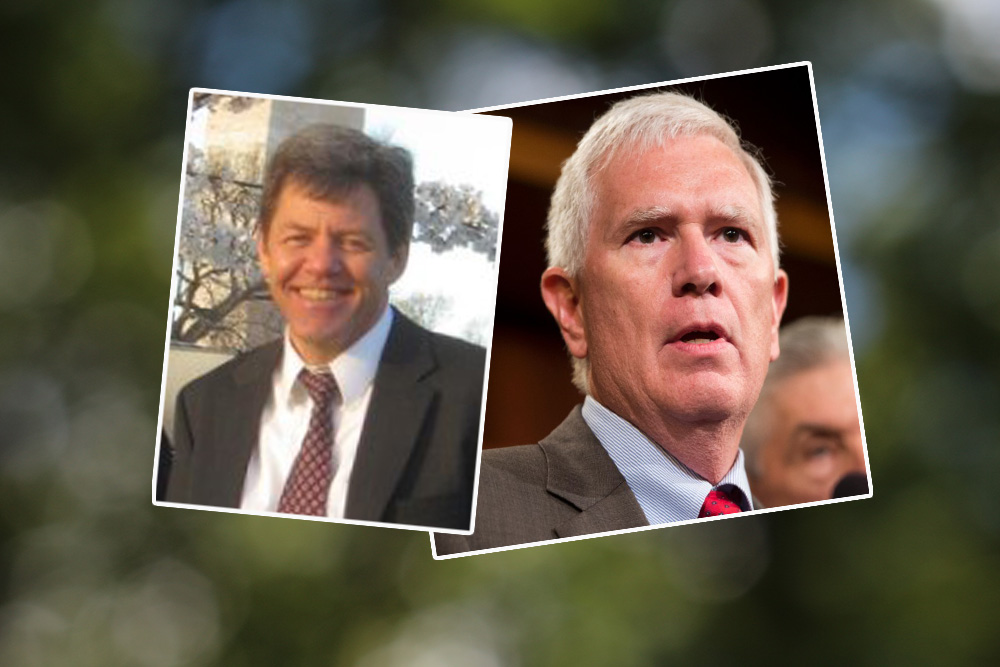
So that’s why one of Mo Brooks’ supporters seemed familiar. On Wednesday, the U.S. Senate candidate declared the endorsement of Mark Pettitt, identified as an “Alabama Strike Force member” and “a beneficiary” of Brooks’ help. But Howard Koplowitz of AL.com noticed something else about Pettitt — he is also Brooks’ chief of staff. That piece of information was withheld during the announcement at Hoover Tactical Firearms. On Thursday, Pettit defended omitting his title in an interview with AL.com: “We don’t like to mix official office with campaigns. … What I do on my day job is supposed to be independent of what I do on my campaign time.” “I didn’t want to use [my title as chief of staff] because it’s using an official title for political gain, and I didn’t think that was appropriate,” Pettitt added. “I intentionally left it off even though it would have been stronger not to do so,” he said, a reference to criticism of Brooks’ lack of support for President Donald Trump. Brooks has been trading barbs with incumbent Sen. Luther Strange, in the 9-person field in the heated midsummer battle for who will serve the rest of Attorney General Jeff Sessions’ Senate term. Other Republican candidates include former Alabama Supreme Court Chief Justice Roy Moore, Dr. James Beretta, Joseph Breault, Alabama Christian Coalition president Randy Brinson, Mary Maxwell, Bryan Peeples and state Sen. Trip Pittman of Baldwin County. The last day to apply for an absentee ballot for the primary is Thursday, Aug. 10. If there is no primary winner — with 50 percent plus one — in the Aug. 15 primary, a runoff is Sept. 26; the general election is Dec. 12.
Walmart Training Academy in Chelsea introduces first graduating class
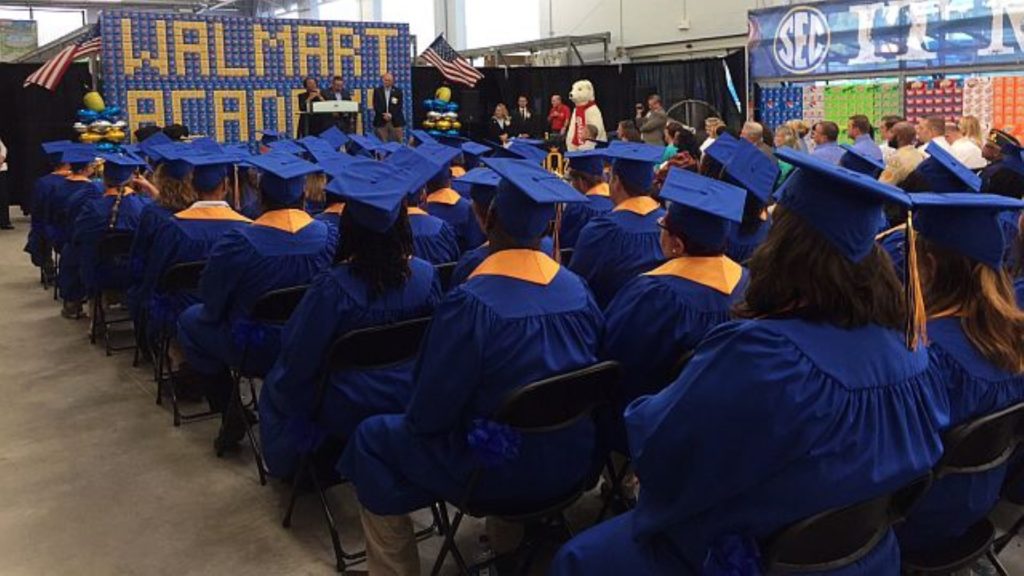
The Chelsea Walmart Supercenter has a new addition – a Training Academy that will supply valuable skills to its leadership team. A graduation program and ribbon-cutting ceremony were held today for 50 supervisors. Each week, nearly 100 employees will be trained from 29 Walmart stores across the greater Birmingham region. Some of the communities included for the training are Alabaster, Bessemer, Birmingham, Calera, Gardendale, Hoover, Hueytown, Springville and Pelham. The training sessions include classroom and sales floor learning opportunities for the supervisors. Also, training will be tailored to the specific department in which they work. John Tow, regional general manager, said by providing this kind of training, customers will enjoy a consistent experience, no matter where they are served. Each graduating supervisor received a certificate at the ceremony. After it was over, visitors were invited to look at the new training academy, which is in the rear of the store. The Chelsea Training Academy is one of 200 that will be opened by year’s end to serve the 4,600 Walmart stores across the country. These academies are being built as part of Walmart’s nearly $3 billion commitment to train its employees. It’s part of a number of major investments Walmart is making in Alabama over the next several months. Republished with permission of Alabama NewsCenter.
Southern Research technology to provide unique look at solar eclipse

A high-definition imaging system developed by Southern Research and deployed on NASA aircraft flying nearly 10 miles above Earth will give scientists a unique look at the sun’s corona during a rare total eclipse taking place over the United States in August. As a bonus, Southern Research’s Airborne Imaging and Recording System (AIRS) will provide highly detailed observations of Mercury’s surface and could uncover the first solid evidence of the existence of Vulcanoids, a belt of asteroids believed to be circling the sun. Johanna Lewis, director of Engineering’s Program Management Office at Southern Research, stands next to the AIRS/DyNAMITE instrument that will provide a unique look at the sun and Mercury during the 2017 solar eclipse. (Southern Research) To capture this data, Southern Research and its AIRS/DyNAMITE technology are supporting the Southwest Research Institute (SwRI), which won a NASA contract to carry out the mission during the Aug. 21 eclipse. AIRS/DyNAMITE turrets will be mounted on two NASA WB-57 research aircraft, which will fly at 50,000 feet and collect high-resolution video and infrared data throughout the first total solar eclipse occurring over the length of the entire continental U.S. in 99 years. “NASA is providing the WB-57 aircraft, Southern Research is providing the unique onboard sensors and Southwest Research Institute is conducting the science,” said Johanna Lewis, director of the Program Management Office in SR’s Engineering Division. “Southern Research will be handling the data collection, and we will be making sure that Southwest Research Institute is getting the best data that we can provide on Mercury and the sun,” she added. Unprecedented observations The total eclipse will unfold over 14 states, from Oregon to South Carolina, as the moon’s shadow completely blocks the sun, turning day into night for a few minutes. For scientists, the event is a chance to get a close look at the otherwise hidden solar corona, as well as planets and stars normally obscured by the sun’s blinding light. SwRI says the mission will provide the clearest images ever of the sun’s outer atmosphere and the first thermal images of surface temperature variations on Mercury. “This airborne platform provides us with higher-quality, higher-speed images than are achievable from current or previous space-borne instruments,” said Amir Caspi, Ph.D., principal investigator of the project and a senior research scientist in SwRI’s Boulder, Colorado, office. “We hope to better understand what causes the corona and why it’s so hot. It’s millions of degrees Celsius, hundreds of times hotter than the visible surface below,” he added. “The corona is the source of electromagnetic storms here at Earth, which can damage satellites, cause power grid blackouts and disrupt communication and GPS signals, so it’s important to better understand it.” ‘Eyes in the sky’ Lewis and John Wiseman, Ph.D., a senior project leader in Southern Research’s Engineering Division, traveled to NASA’s Johnson Space Center in Houston this month for test flights of one of the WB-57 aircraft with an AIRS/DyNAMITE instrument modified for the mission. Three NASA AIRS/DyNAMITE-equipped WB-57 aircraft fly over Houston. (Southern Research) “The system provides a means of tracking events you might not be able to get elsewhere, with simultaneous mid-wave infrared and visible light data,” said Wiseman, one of the instrument’s inventors. “It’s configurable, and we have had a number of payloads in it, so it’s very versatile.” Southern Research developed the technology in partnership with NASA, which was looking for a system to capture HD video of the July 26, 2005, launch of the Space Shuttle’s “Return to Flight” mission after the Columbia mishap. Acting as “eyes in the sky” for NASA, the system, from a distance of 20 miles, captured full-motion video of the shuttle’s liftoff and tracked it to 146,000 feet. “It was developed as an experiment, and it was supposed to have about five to 10 flights,” Wiseman said. Since then, the high-altitude video system has been used to monitor critical rocket launches, to collect data for science missions and to assist the Department of Defense on security missions. In the past six years alone, the AIRS/DyNAMITE technology has flown on almost 500 flights. Extended view of eclipse On Aug. 21, the twin WB-57 aircraft flying in the stratosphere over Carbondale, Illinois, will tag-team the total eclipse, gathering exceptionally accurate measurements of the solar corona to better understand how energy moves throughout the sun’s atmosphere, according to NASA. From a vantage point high above the clouds and Earth’s weather systems, the AIRS/DyNAMITE-equipped planes will get a clear view of the eclipse and collect data during totality for about 8 minutes. That’s far longer than the 2 minutes and 40 seconds available to ground stations monitoring the event. In addition, the instruments will be in position to make unprecedented observations of Mercury’s surface in infrared light, which can be otherwise hindered by radiation from the sun. Scientists hope these measurements will give new information about how Mercury’s surface temperature changes as its day turns to night, shedding light on its surface composition, NASA says. “Because Mercury is so close to the sun, it’s very difficult to perform direct observations. When the moon is going into eclipse over the sun, we will have a rare opportunity to collect Mercury infrared data,” Lewis said. There’s even more to this mission. While the sun’s bright light is blocked, AIRS’ HD cameras will search the skies for evidence of vulcanoids, a hypothetical band of asteroids traveling around the sun in Mercury’s atmosphere. That’s important because vulcanoids could provide insights about the creation of the planets and the solar system’s earliest period. “Most people have never heard of vulcanoids before. This will be a unique opportunity for them to look for these things that scientists theorize are there, but nobody has ever proven,” Lewis said. “If we provided the instrument that proves they were there, that would be a major accomplishment.” Flying with the WB-57 Southern Research will play another important role in the eclipse mission. A Houston-based SR communications engineer, Donald Darrow, will serve as the special equipment operator in the back seat of one of the WB-57 aircraft, operating the AIRS/DyNAMITE instrument during the flight. Lewis said a
Donald Trump whips up supporters against Russia probe
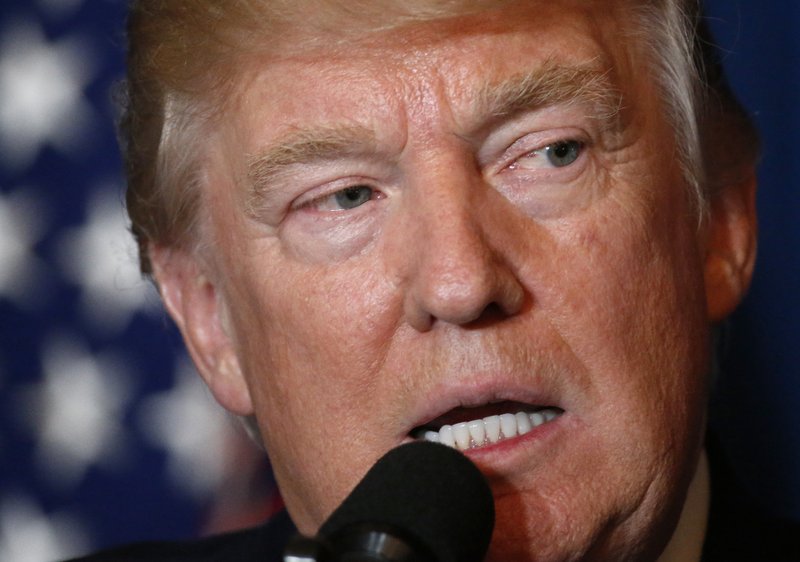
President Donald Trump said Thursday he hopes for a “truly honest” outcome from the Russia investigation that has consumed the opening months of his presidency, and he challenged Democrats to either continue their “obsession with a hoax” or begin serving the interests of the American people. At a boisterous campaign rally in Trump-friendly West Virginia, Trump slammed the investigation as a “fake story that is demeaning to all of us and most of all demeaning to our country and demeaning to our Constitution.” He commented hours after news broke that Robert Mueller, the special counsel leading the investigation, had empaneled a grand jury in the case. “I just hope the final determination is a truly honest one, which is what the millions of people who gave us our big win in November deserve and what all Americans who want a better future want and deserve,” Trump told thousands of cheering, sign-waving supporters packed into an arena in Huntington. Trump overwhelmingly won the state in the November election, partly due to his promises to revive a slumping coal industry. The president, who remains agitated over the investigation into allegations of coordination between his campaign associates and Russian government officials, said Democrats have a decision to make. “They can continue their obsession with the hoax or they can serve the interests of the American people,” he said. Trump maintains there were no ties between his campaign and Russia and says no wrongdoing was committed. His frustration over the investigation peaked in recent weeks as he began attacking Attorney General Jeff Sessions for recusing himself from the investigation. Sessions, most recently a U.S. senator, was an early and ardent Trump supporter. “Most people know there were no Russians in our campaign. There never were,” he told the cheering crowd in West Virginia. “We didn’t win because of Russia. We won because of you.” Trump argued that Democrats are pushing the “totally made-up Russia story” because “they have no message, no agenda and no vision.” “The Russia story is a total fabrication. It’s just an excuse for the greatest loss in the history of American politics,” he said, referring to his victory over Hillary Clinton. “It just makes them feel better when they have nothing else to talk about.” His suggestion for Democrats: “Try winning at the voter booth. Not going to be easy, but that’s the way you’re supposed to do it.” Republished with permission of The Associated Press.
Employer-based health coverage likely to stay awhile

Get your insurance through your employer? The ongoing political turmoil around “Obamacare” all but guarantees you’ll still be able to do that. Ask Walt Rowen, whose business is etching glass but whose experience managing century-old, family-owned Susquehanna Glass makes him something of an expert on health care. He’s provided coverage to employees, then canceled it, steering them to the health insurance exchange. But with those premiums rising, Rowen this year is again covering his 70 or so workers under the umbrella of employer-sponsored health insurance. Employer-provided health insurance is so ingrained in the American workplace that people expect it to continue even as politicians thrash out the role of government in health care. That’s according to polling, business owners and consumers. And in a nearly saturated labor market, employers don’t want to give workers a reason to work somewhere else. “I think a company – any size company – would be incredibly afraid to just cancel its insurance policy and say the hell with it,” says Rowen, whose company is located in Columbia, Pennsylvania. He said that could result in employees fleeing, especially in states where the Affordable Care Act insurance markets are weak. With the GOP crusade to repeal and replace “Obamacare” failing, the federal mandates that people have insurance and that employers with more than 50 workers provide it seem likely to stay in place in the foreseeable future. The Trump administration on Tuesday pledged to keep working with Congress on a rewrite. “Obamacare’s mandates saddled many with health care costs they simply couldn’t afford,” said White House spokeswoman Sarah Huckabee Sanders. For now, the Trump administration is considering whether or not to continue paying the law’s cost-sharing subsidies, which have helped lower premiums. Without those subsidies, it’s estimated that premiums will rise and insurers will leave markets. The ACA requires companies with 50 or more full-time employees to provide insurance to employees and their dependents. The Kaiser Family Foundation says nearly 96 percent of companies of that size already were offering coverage before the law took effect in 2014. Nearly 35 percent of companies with fewer than 50 workers also were offering insurance. Removing the employer mandate wouldn’t sit well with a wide swath of the American public. A poll by The Associated Press-NORC Center for Public Affairs Research says 61 percent oppose revoking the requirement, including 58 percent of Republicans. Workers have been getting their health insurance through their employers for decades, since the U.S. government exempted employer-paid health benefits from wage controls and income tax during World War II. Nearly 90 percent of workers are in companies that provide health benefits, according to the Kaiser Family Foundation/HRET annual survey in 2016. Taking into account dependents, roughly half of Americans are covered by employer-based insurance. Large companies “need to attract and retain employees and they’d be at a competitive disadvantage if they stopped offering health benefits,” said William Kramer, executive director for national health policy for the Pacific Business Group on Health. As a result, human resource consultants say it’s likely that businesses will remain committed to offering coverage. Some experts question whether the ACA’s employer mandate makes much, if any, difference when there’s a solid business case for providing health care: With unemployment low and the labor market tight, benefits give employers an advantage in recruiting and retaining the best workers. “What kind of message are you giving to employees if you say, ‘I’m going to take this away?’ Are you really willing to risk losing people?” asks David Lewis, CEO of OperationsInc, based in Norwalk, Connecticut. Even if the employer mandate had been repealed, the Congressional Budget Office estimated that larger companies would have been hard-pressed to cancel their health benefits, although some smaller firms would have done so. “As soon as you take it back, you cause massive employee dissatisfaction,” said Jay Starkman, CEO of Engage PEO, a human resources provider whose clients include many small and mid-sized businesses. Rowen, the glass business owner, says his health insurance decisions had less to do with the employer mandate than with cost and employee retention. In the four years before the ACA took effect, Susquehanna Glass had fewer than 50 employees and saw its premiums rise between 15 percent and 20 percent a year. “We were fiddling all the time trying to keep our health care costs for our employees as affordable as possible,” Rowen recalls. He hired an expert to help his employees find insurance on the exchange in Pennsylvania. Lower-paid employees qualified for subsidies, while higher-paid workers could afford plans or went on their spouses’ plans, he said. In some cases, Rowen gave bonuses or raises to help workers afford insurance. He says he owed a penalty of about $40,000 for not providing insurance – less than the six figures he thinks he would have paid to provide group insurance. But by 2016, he said, his workers were complaining that their premiums were increasing. Susquehanna Glass by that time had grown to about 70 employees – enough to qualify for less-expensive group plans joined by medium-sized businesses. Many of his new employees were younger and less expensive to insure. He found that purchasing group health insurance would cost just over $100,000 – not as much as he’d feared. “If they were not able to get an affordable one with me and they found another company that does offer one,” he says, “They might be forced to make the decision to leave me.” Republished with permission of The Associated Press.
Cities baffled as Jeff Sessions targets them on immigration

Attorney General Jeff Sessions took new steps Thursday to punish cities he believes are not cooperating with federal immigration agents in a move that was met with bewilderment by local officials who said they did not know why they were being singled out. The Justice Department sent letters to four cities struggling with gun violence, telling them they would not be eligible for a program that provides money to combat drug trafficking and gang crime unless they give federal immigration authorities access to jails and notify agents before releasing inmates wanted on immigration violations. Baltimore, Albuquerque, and Stockton and San Bernardino in California all expressed interest in the Justice Department’s Public Safety Partnership, which enlists federal agents, analysts and technology to help communities find solutions to crime. “By taking simple, commonsense considerations into account, we are encouraging every jurisdiction in this country to cooperate with federal law enforcement,” Sessions said in a statement that accompanied the letters. “That will ultimately make all of us safer – especially law enforcement on our streets.” The threat marks Sessions’ latest effort to force local authorities to help federal agents detain and deport people living in the country illegally as part of a push to reduce crime he believes is linked to illegal immigration. The attorney general has repeatedly vowed to withhold federal money from cities that do not cooperate, similar to how previous administrations have held back highway funds during debates over the speed limit and drinking age. But it was not immediately clear to some of the cities why they were targeted. In a letter to Sessions, Republican Albuquerque Mayor Richard Berry denied that New Mexico’s largest city is a sanctuary for immigrants living in the country illegally and said he has been trying to work with immigration authorities since taking office in 2009. In fact, Berry said, Immigration and Customs Enforcement staffing at the prison transport center fell in recent years. “If your agency has questions or concerns with our (Bernalillo) County jails, I would refer you to their leadership,” Berry wrote. Peter Simonson, executive director of the American Civil Liberties Union in New Mexico, called the demands “a bullying tactic.” Another concern raised by cities is that police who patrol the streets book suspects into jails run by county or state authorities over which they have no control. The Justice Department’s letters focus on giving federal immigration agents access to such detention facilities. In San Bernardino, officers book anyone they arrest into jails that are run by the county, not the Southern California city of 216,000 people, said Police Chief Jarrod Burguan. “The city of San Bernardino has never taken any formal act to declare itself a sanctuary city,” Burguan said. “Our policies have been very, very consistent over the years.” Stockton Police Chief Eric Jones said his officers also book suspects into a county-run facility and are tasked with fighting violent crime, not enforcing federal immigration laws. “That does not mean we don’t work with our other federal partners, but that is just not a function of ours,” he said. Nor do police enforce immigration laws in Baltimore, where arrestees are taken to a jail run by the state, said Anthony McCarthy, a spokesman for Mayor Catherine Pugh. The state says it adheres to federal policies on immigration in its detention system. “We are receiving tremendous federal support for the violence-reduction actions, and we wouldn’t want anything to deter the progress we hope to make on that front,” McCarthy said. Sessions has pledged to make fighting immigration and street crime the Justice Department’s top priority, but the strategy is putting him at odds with some city leaders, who say the best way to fight crime and build community trust is to keep local police out of federal immigration matters. Last week, Sessions told cities they must meet the same conditions or lose out on millions of dollars from a separate grant program that helps police departments pay for everything from bulletproof vests to body cameras, a move that made some local officials more defiant. In the four letters, the Justice Department asked the prospective cities’ police departments to show proof of their compliance by Aug. 18. In Albuquerque, immigrant student activists said the letter was part of the Trump administration’s broader attack on immigrants. “It is a vision of terror for families like mine,” said Gabriela Hernandez, Southwest Organizer for United We Dream. The Justice Department in June tapped 12 cities to receive aid through the Public Safety Partnership, and officials said the four cities targeted Thursday had expressed interest in the next chance at participating. Cities were chosen based on higher-than-average rates of violence and willingness to receive the help and training. Cities that want to be involved going forward will have to show they allow unfettered communication between police and federal immigration authorities, give agents access to jails in order to question immigrants and provide agents with 48 hours of notice when someone in the country illegally is about to be released. Republished with permission of The Associated Press.


